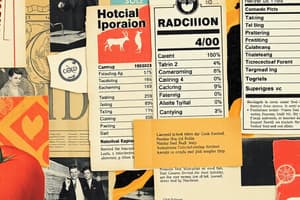Podcast
Questions and Answers
How should you label food on-site?
How should you label food on-site?
All items not in their original containers must be labeled, including the common name of the food or a statement that clearly identifies it.
How should you label food onsite for retail sale?
How should you label food onsite for retail sale?
Label should include the common name, quantity, ingredients in descending order by weight, list of artificial colors/flavors, manufacturer's details, and major food allergens.
What is date marking?
What is date marking?
Ready-to-eat TCS food must be marked if held for longer than 24 hours, indicating when it must be sold, eaten, or thrown out.
How should you date mark for commercially processed food?
How should you date mark for commercially processed food?
How should you date mark for storage?
How should you date mark for storage?
What is rotation?
What is rotation?
What are the temperature guidelines for storing TCS food?
What are the temperature guidelines for storing TCS food?
How should you prevent cross-contamination?
How should you prevent cross-contamination?
Flashcards are hidden until you start studying
Study Notes
Food Labeling
- Label all food items not in original containers with a common name or identification statement.
- No label is needed if the item cannot be mistaken for another.
On-site Retail Food Labeling
- Include the common name, quantity, ingredients in descending order by weight, and allergens.
- Must have manufacturer or distributor information, including name and place of business.
Date Marking
- Ready-to-eat TCS (Time/Temperature Control for Safety) food held over 24 hours must be date marked.
- Store for no more than seven days at or below 41°F (5°C).
Commercially Processed Food Date Marking
- Mark commercially processed food with a use-by date if it is within seven days of opening, ensuring adherence to food safety.
Storage Date Marking
- Combine food with different use-by dates based on the earliest date for dishes.
- Example: Jambalaya creation would base its date on the shrimp's earlier use-by date.
Food Rotation
- Use the oldest inventory first by following FIFO (First In, First Out) principles.
- Place items with earlier dates in front and use them first, discarding expired items.
Temperature Guidelines
- Maintain TCS food at 41°F (5°C) or lower, or 135°F (57°C) or higher.
- Store various food items in their coldest parts, away from access doors and frequently opened areas.
- Ensure temperature measuring devices are accurate to ±3°F or ±1.5°C.
Preventing Cross-Contamination
- Store food in clean, dry areas; avoid locker rooms, restrooms, mechanical rooms, and under sewer lines.
- Discard unsafe food that is damaged, spoiled, or incorrectly stored.
- Store all food items in intended containers; keep single-use items sealed in original packaging.
- Ensure a clean and dry storage environment; clean spills and equipment regularly, using sanitizable containers only.
Studying That Suits You
Use AI to generate personalized quizzes and flashcards to suit your learning preferences.




